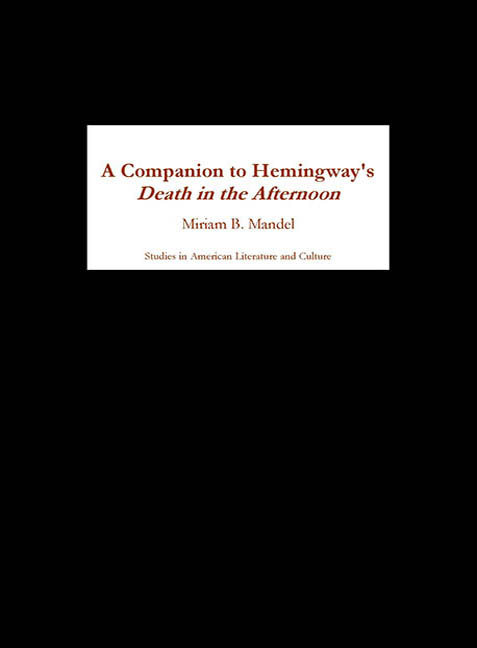Book contents
- Frontmatter
- Dedication
- Contents
- Acknowledgments
- Hemingway Works That Address the Bullfight
- A Note on the Text of Death in the Afternoon
- Introduction
- Composition, Sources, and Backgrounds
- The Composition, Revision, Publication, and Reception of Death in the Afternoon
- “Devout Again by Cynicism”: Lord Byron and Don Juan in Death in the Afternoon
- “I like you less and less”: The Stein Subtext in Death in the Afternoon
- Subject and Author: The Literary Backgrounds of Death in the Afternoon
- Reading Texts, Paratexts, and Absence
- On Authorship and Art
- And What Came After
- Works Cited
- Notes on the Contributors
- Index
“Devout Again by Cynicism”: Lord Byron and Don Juan in Death in the Afternoon
from Composition, Sources, and Backgrounds
Published online by Cambridge University Press: 27 April 2017
- Frontmatter
- Dedication
- Contents
- Acknowledgments
- Hemingway Works That Address the Bullfight
- A Note on the Text of Death in the Afternoon
- Introduction
- Composition, Sources, and Backgrounds
- The Composition, Revision, Publication, and Reception of Death in the Afternoon
- “Devout Again by Cynicism”: Lord Byron and Don Juan in Death in the Afternoon
- “I like you less and less”: The Stein Subtext in Death in the Afternoon
- Subject and Author: The Literary Backgrounds of Death in the Afternoon
- Reading Texts, Paratexts, and Absence
- On Authorship and Art
- And What Came After
- Works Cited
- Notes on the Contributors
- Index
Summary
In the course ofDeath in the Afternoon, Ernest Hemingway refers to an astonishing host of writers and their work: Miguel de Cervantes (73), Jean Cocteau (71), T. S. Eliot (139), William Faulkner (173), Ronald Firbank (73), Richard Ford (53), Waldo Frank (53–54), Andre Gide (205), Dashiell Hammett (228), W. H. Hudson (133), Aldous Huxley (190), Henry James (467), Christopher Marlowe (73), Andrew Marvell (139), Guy de Maupassant (102), Mungo Park (134), Raymond Radiguet (71–72), Shakespeare (73, 102), Bishop Stanley (133), Gertrude Stein (1), Stendhal (204), Lope de Vega (73), Gilbert White (133), Walt Whitman (205), John Greenleaf Whittier (133, 144), Oscar Wilde (205), and Virginia Woolf (106). He also alludes obliquely to Alexandre Dumas (212–13), Sigmund Freud (53), O. Henry (182), Henry Wadsworth Longfellow (266), Leo Tolstoy (180), and very likely other writers as well — an impressive tour de force for a writer who also declares, in the course of the same work, that a good writer should not be “anxious to make people see he is formally educated, cultured or well-bred” (DIA, 192).
Perhaps most interesting of all, in this extraordinarily allusive work that is about writing as much as it is about bullfighting, is its author's unacknowledged indebtedness to Lord Byron in general and to his masterpiece, Don Juan, in particular. Nancy R. Comley and Robert Scholes have argued that in the Meier-Graefe and Huxley passages of Death in the Afternoon Hemingway both acknowledged and concealed his sources (116), and Robert Paul Lamb has observed, in reference to Henry James, that Hemingway was “loath to acknowledge any influence (which was his usual response to any writer who had truly mattered in his development)” (477). It does seem that the more Hemingway was indebted to a writer, the more likely he was to obscure his sources — hence, Byron is never explicitly named in Death in the Afternoon. But his presence is nevertheless everywhere in this highly personal work. Even in the intertextuality of Death in the Afternoon, Hemingway follows Byron, whose “Don Juan is marked by a mode of incessant but curiously casual, apparently inconsistent, allusion” (Manning, 201).
- Type
- Chapter
- Information
- A Companion to Hemingway's Death in the Afternoon , pp. 43 - 58Publisher: Boydell & BrewerPrint publication year: 2004

